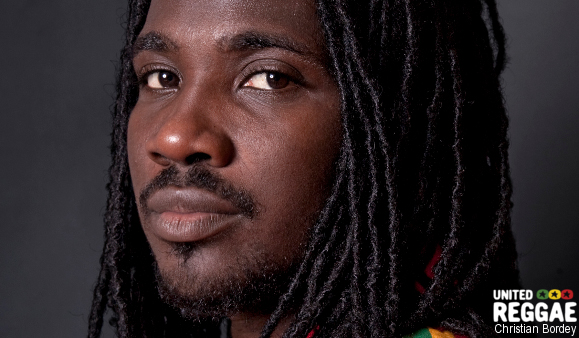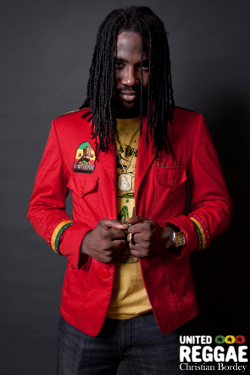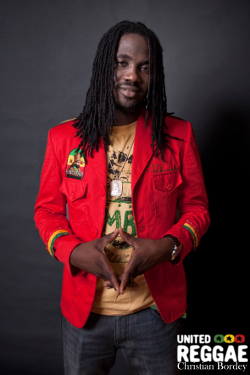Articles about reggae music, reviews, interviews, reports and more...
Interview: I-Octane
- Home
- Articles
- Interviews
- Interview: I-Octane

Interview: I-Octane
"Don't take anything in the business personally. As long as you have this approach you will reach far"
Sampler
Byiome Muir, who sings and deejays in equal measure as I-Octane, grew up in Sandy Bay the musically fruitful parish of Clarendon. A boisterous, ambitious youth, he began attracting notice for his musical abilities while still at school, but his extracurricular performances took a back seat to his studies as he prepared for a career in architecture. Sadly his application for a student loan were rejected and his single parent family lacked the means to support so long a period of vocational study. However, this freed him up to focus on his music, until a passing producer seeing him hanging around outside a locked Kingston studio led to an audition for Donovan Germain at Penthouse records. There he took the name I-Octane in reference to his energetic temperament yet it was after he left Germain’s stable for Arrows Recording three years later that he had his first hit Stab Vampire in 2007. A slew of heavily rotated singles and show bookings followed before the fine-locked vocalist made the transition to established star with an attention-grabbing performance at Reggae Sumfest 2011. Now he is poised to cement his fame internationally with the release of his official debut album 'Crying To The Nation' overseen by Shaggy impresario Robert Livingstone and distributed by VP Records. Featuring a variety of producers such as Livingstone, Dean Fraser, Paul "Cashflow" Mitchell, Christopher Birch and engineers including Laurent Tippy Alfred and Shane Brown, the album is set to drop February 14th. The same month, two years after he toured with Tarrus Riley across Europe, he will return to France and the Netherlands as a headliner. Angus Taylor spoke to a young man at ease with one-drop and dancehall rhythms, the science of marketing and social networking and, most crucially, the weight of expectation his shoulders…

You originally wanted to be an architect. Designing buildings is similar to making music in that you create things that people will remember. Did you have big ambitions when you were young?
Yeah man. I actually did well in school in that department but apparently the world boiled down back to money again. I mean you have enough youth with enough talent but if the financial backing is not strong so they just have to settle for half the amount they could accomplish. I was in school but my mother never really had the money to finance my education so I after I left pre college with two year diploma I had to just stop. Musically I was just a diamond in the rough talent so music something I did in my spare time out of natural love for it. It wasn't my main focus because education came first. I'd just do it voluntarily just like I'd play football voluntarily. But after I left school the passion for it grew and kept on following me. Growing in the slum you never want to become a non-progressive element involved in crime or violence so I just occupied my time with music.
How did get your break into music?
In Clarendon I was at a penny concert when one individual from Kingston was there and liked the vibes. So he started bringing me to the studio in Kingston because he was established. Then one day he said to me "I no feel like going studio today" so I just went by myself. That day something magical happened. I was locked out of the studio for the entire day because I came on my own. But then a random individual went to the studio to do some work with his artist and passed me outside at ten in the morning. And when he came out at six in the evening I was still out there sitting down waiting for an opportunity to go in. So he was like "Yow, you is an artist? I like the determination you have. I pass you here and still pass you back. Let me hear the material you have".
 Donovan Germain said "You have the talent, image, everything"
Donovan Germain said "You have the talent, image, everything"
How did you meet Donovan Germain?
He introduced me to a lady named Marcia Simpson who was a good friend of Donovan Germain but at the time I was a deejay and she only managed singers and not deejays. So she said she had a friend and I would fit quite well in his camp. When I heard it was Donovan Germain I was like "Whoa! This is a great opportunity" because Donovan had Buju and all of the great artists go through him. When I did the audition he wasn't there so I did the audition with an engineer and left. Then he called me a week later and said "You have the talent, image, everything". But he never had the time to focus - I wasn't the main priority because he had Buju and everyone that was current - so after three years I just told him I was going to go out into the world and see if I could make it on my own and he supported me same way. That was how Arrows came in and I spent a couple of years at Arrows. I'm actually on my own now. I manage myself. I do shows and pay for everything with cash out of my pocket. I have a nice team but I actually manage myself. I'm not signed to anybody. I'm an independent artist.
How does it feel to be about to get your official first album to the people?
Over the years I was working towards getting out an album but I just had to get the brand of "I-Octane" to a certain level before I put out a debut album so the people will know about the brand "I-Octane". Now the people are familiarized with what the brand has to offer, the time is right and we have just put in hard work and are getting the debut album out and everybody seems to be excited about it.
Tell me about the process of making the album. Were the rhythms already built or were rhythms built around you?
 The process was hectic because at the time I was on tour. So each time I went back to Jamaica it was off the plane- in the studio-record! Most of the rhythms were created already. I would select the rhythms or we'd have musicians come in and make rhythms around songs that were written already. That process resulted in a complete album in the space of a month. It was an independent project at the time. Robert was making the album and then shopped it around. A couple of companies heard it and loved and then VP came on board and wanted to be a part of it. It wasn't directed by a record company. So it was hectic in the time space because the album was supposed to be released in September. I was working from the end of June to July so we only had a month to come up with the album, mix it then get it out to release in September but apparently we never met the deadline so it was put back to the second week of February - Valentine's Day!
The process was hectic because at the time I was on tour. So each time I went back to Jamaica it was off the plane- in the studio-record! Most of the rhythms were created already. I would select the rhythms or we'd have musicians come in and make rhythms around songs that were written already. That process resulted in a complete album in the space of a month. It was an independent project at the time. Robert was making the album and then shopped it around. A couple of companies heard it and loved and then VP came on board and wanted to be a part of it. It wasn't directed by a record company. So it was hectic in the time space because the album was supposed to be released in September. I was working from the end of June to July so we only had a month to come up with the album, mix it then get it out to release in September but apparently we never met the deadline so it was put back to the second week of February - Valentine's Day!
Most of the material is new but you still included Lose A Friend which was adopted as an anthem during last year's state of emergency. Were you on the island at the time?
Yes, I was. I was away from it but it still affected the I mentally in terms of how the media covered it in terms of going out to the world. It's different when you're actually there to when you just get it in a newspaper you read. You have a different perspective, I think. A whole heap of people lost their lives so it was a mournful time for the country and it never looked good on the country itself so it affects everybody still. But these things happen and we have to get past it.
You sing a lot about social issues but you've talked in the past about not being a political person, not being partial to any party or government.
I am a youth who doesn't really deal with politics still. I'm just concerned for the people and that's why I choose to do certain songs that help the people alleviate themselves from certain stress. The next man might have a different perspective but politics is like religion to me and I don't really do religion nor politics. Those things segregate the people and mash them up mentally, creating crime and violence and war. They never give any form of enlightenment or light so for me politics is a no-no still.
 I don't do religion nor politics. Those things segregate the people
I don't do religion nor politics. Those things segregate the people
You collaborate with Agent Sasco, Tarrus Riley, and Alborosie on the album. Did you get to spend any studio time with them or were their parts recorded elsewhere?
Alborosie had the track sent to him and he delivered it back to I-Octane and we to'd and fro'd and finalised it. But Tarrus Riley and Assassin were in the studio and the vibes were great. Tarrus Riley is a very experienced artist. I call him my big brother because he is a youth who has shown me a lot of things. When we were touring he was the youth that came to me and said "I-Octane. Don't cover the microphone" because he is well experienced. Assassin is one of the leading dancehall artists and he is so experienced also. It was pure great vibes in the studio and natural energy so everything just came alive.
You seem very switched on to social networking, you keep your fans updated by blog and Facebook. How important are these aspects to success as a music artist in the modern age?
It's very imperative because without the fans enough artists lose it. They feel like they are the ones that are powerful but without the fans you cannot become an artist. You could be the greatest artist singing the best songs in the world but if not one individual likes one of your songs then that record will never move and never break. So you have to have those things there, keep those things there close to you. Artists are busy but whenever you have the time you have to show the fans you appreciate their effort and their time also.
 Without the fans you cannot become an artist
Without the fans you cannot become an artist
I notice you don't use Twitter much. For an artist so engaged with social networking that must be a conscious decision.
Yeah man. I wasn't a fan of the Twitter thing. I'm not against it but I'm not a fan. I was interested at first but people sometimes use Twitter for the wrong reasons. For instance some man would just come on the street and write and tweet out "Mi see I-Octane in Orlando with a new girl". They assume things. They don't know if it's a business meeting or what? But they Twitter something like that out to the world and readers just take it like how they read it. It causes problems because people use it for the wrong reasons so I wasn't a fan of it.
You've mentioned branding several times. How important is it to understand branding and marketing as an artist today?
 It's very imperative to know that because whether you like it or not this is 80% business. The rest is talent and mindset. Frame of mind is 10%, talent is 10% but it is 80% business. You have a whole heap of great artists in the world who are even more creative than some of the established artists right now but if you are not business minded or you are not marketable then it will not work. So you have to be a brand. People have to see a brand. A brand like any brand. So people say I-Octane is a brand and no say I-Octane is an artist but then even if I-Octane is not on stage they can recognize that there is I-Octane same way.
It's very imperative to know that because whether you like it or not this is 80% business. The rest is talent and mindset. Frame of mind is 10%, talent is 10% but it is 80% business. You have a whole heap of great artists in the world who are even more creative than some of the established artists right now but if you are not business minded or you are not marketable then it will not work. So you have to be a brand. People have to see a brand. A brand like any brand. So people say I-Octane is a brand and no say I-Octane is an artist but then even if I-Octane is not on stage they can recognize that there is I-Octane same way.
What's the best advice you've received in the business?
The best piece of advice was: have an open mind to constructive criticism. The business is a business so don't take anything in the business personally. As long as you have this approach you will reach far. Because you could go to the studio this week to do an interview and get locked out of the studio for some reason but if you were to take that personally you will write off that studio forever. When after a few years that same studio might arrange for you to reach the next level but because you took what happened before personally and the opportunity passed. For me now, you have a whole heap of producers who never used to voice I-Octane. I linked them every day and they never used to voice me but when I became an established artist they were ready to voice me. But I don't take it personally because they are a big label and these are big producers, their name is already out in the world, so I have to put those things aside and remember that voicing for those producers has also enhanced me too.
 Reggae is a global language like football - everybody knows football and every nation knows reggae music
Reggae is a global language like football - everybody knows football and every nation knows reggae music
You've talked in past interviews about aiming for Bob Marley status. Is the sky the limit for your ambitions?
Yeah man. I want to reach the highest level as a musical star. That's why I keep the Almighty close and pray for those things every day. Because the world itself is a rough world and reggae music is the biggest music in the world, yet still underground because we don't really have institutions and it wasn't properly developed. It's a global language like football - everybody knows football and every nation knows reggae music. But what happened to reggae music is you have the same people in the business who at first help it to reach a certain status and then in the long run they are the same ones trying to tear it down. So you have to just know in reggae music that you have to try to sidestep all of those things there and just do you and do it to your best ability.
Read more about this topic
Comments actually desactivated due to too much spams
Browse by categories
Recommended Articles
Latest articles
Recently addedView all
© 2007-2026 United Reggae. All Rights Reserved. Reproduction in whole or in part is prohibited. Read about copyright
Terms of use | About us | Contact us | Authors | Newsletter | A-Z














